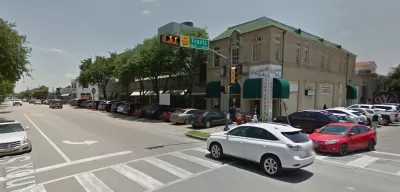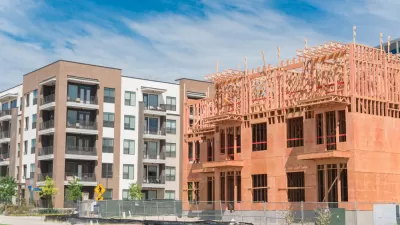Dallas relies on a formula introduced in 1965 to determine parking requirements for new developments, but city planners are studying how to update the city's development code for the future.

In an article for D magazine, Matt Goodman provides background and details on an ongoing effort to update parking requirements in the city of Dallas, Texas—an auto-oriented built environment if ever there were one. The city's current parking requirements depend on a section of the development code created in 1965 and called 51A, according to Goodman.
The city has been studying an update to the city's parking requirements for two years—ever since a high profile incident detailed at the time by the Dallas Morning News. The local chapter of the American Institute of Architects is paying attention—recently bringing in a star witness to make the case for reforms—namely, Donald Shoup, author of the definitive book on parking reforms, The High Cost of Free Parking. Shoup told the group that Dallas has some of the more ridiculous parking requirements he's ever seen.
The question of how far the city of Dallas will go in implementing parking requirement reform is still an open question—but the source article linked below provides tons of background, examples, and options to inform the city's decision. Dallas will be a parking requirement reform model to watch—for better or worse—soon.
The city paused its study in August 2021, due to turnover at the city, but is expecting to write its staff recommendation in 2022.
FULL STORY: The City of Dallas Is Putting Parking Spots in Its Crosshairs

Planetizen Federal Action Tracker
A weekly monitor of how Trump’s orders and actions are impacting planners and planning in America.

Chicago’s Ghost Rails
Just beneath the surface of the modern city lie the remnants of its expansive early 20th-century streetcar system.

San Antonio and Austin are Fusing Into one Massive Megaregion
The region spanning the two central Texas cities is growing fast, posing challenges for local infrastructure and water supplies.

Since Zion's Shuttles Went Electric “The Smog is Gone”
Visitors to Zion National Park can enjoy the canyon via the nation’s first fully electric park shuttle system.

Trump Distributing DOT Safety Funds at 1/10 Rate of Biden
Funds for Safe Streets and other transportation safety and equity programs are being held up by administrative reviews and conflicts with the Trump administration’s priorities.

German Cities Subsidize Taxis for Women Amid Wave of Violence
Free or low-cost taxi rides can help women navigate cities more safely, but critics say the programs don't address the root causes of violence against women.
Urban Design for Planners 1: Software Tools
This six-course series explores essential urban design concepts using open source software and equips planners with the tools they need to participate fully in the urban design process.
Planning for Universal Design
Learn the tools for implementing Universal Design in planning regulations.
planning NEXT
Appalachian Highlands Housing Partners
Mpact (founded as Rail~Volution)
City of Camden Redevelopment Agency
City of Astoria
City of Portland
City of Laramie





























